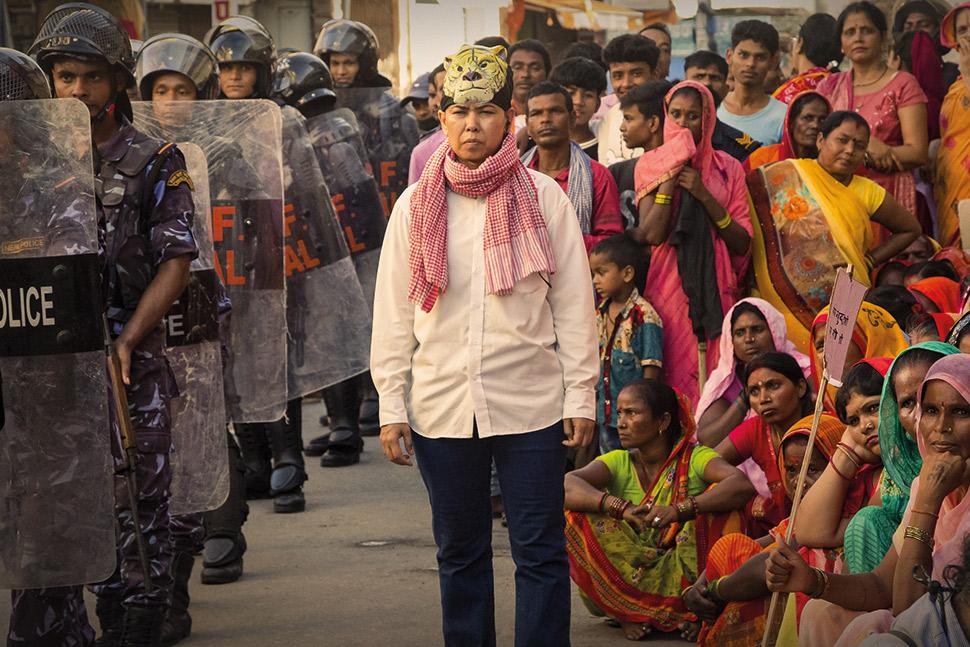| Director: | Deepak Rauniyar |
|---|---|
| Production: | Aadi Films (Deepak Rauniyar, Asha Magrati), Baasuri Films (Ram Babu Gurung), Tannhauser Gate (Alan R. Milligan) |
| Running Time: | 118’ |
| Language: | Nepali, Maithili, Hindī |
| Country: | Nepal, USA, Norway |
| Main Cast: | Asha Magrati, Nikita Chandak, Dayahang Rai, Reecha Sharma, Bijay Baral, Gaumaya Gurung, Aarti Mandal, Ghanashyam Mishra, Prameshwar Kumar Jha, Pashupati Rai, Niraj Shrestha |
| Screenplay: | Deepak Rauniyar, David Barker, Asha Magrati |
| Cinematographer: | Sheldon Chau |
| Editor: | J. Him Lee |
| Production Designer: | Aki Thekpa |
| Costume Designer: | Janaki Kadayat |
| Music: | Vivek Maddala |
| Sound: | Samrat Khanal, Leandros Ntounis |
Pooja, Sir

synopsis
When two boys are kidnapped in a border town in Nepal, Detective Inspector Pooja is sent from Kathmandu to solve the case. However, upon her arrival, the brewing political unrest and violent protests throw her off course, compelling her to seek help from Mamata, a local Madhesi policewoman. By putting aside systemic discrimination and pushing through everyday misogyny, the women manage to solve the case—but at what personal cost? Inspired by real events which took place in Southern Nepal during the 2015 race protests.
director's statement
I am Nepali of the Madhesi ethnic group. I grew up in an environment where, at least once a day, I was accused of sneaking into Nepal from India or likely to be stopped by the police because of my skin colour. Recently, following the Civil War and the introduction of a new constitution, hundreds of thousands of dark- skinned Madhesis have taken to the streets, demanding equal rights with the lighter-skinned population. The government’s response was to suppress the protests resulting in the deaths of over 100 people. Pooja, Sir is set in the present day in a Nepali/Indian border town, and it is inspired by a real case, my experiences, and those of my wife and collaborator, Asha Magrati, who plays the role of Pooja and wrote the script with me. Choosing the police procedural genre to tell this story allows the audience to explore the underbelly of the Madhesi community through the eyes of a light-skinned detective. What she learns during her investigation into the kidnapping deepens her comprehension of the institutionalised racism faced by one-third of Nepal’s population. I believe in the power of film to help people understand one another’s predicaments and our shared experiences of life and death. An exchange of perspectives could become something beautiful, not only for Nepalis but for people worldwide, as race, discrimination, and national borders are issues of major importance for communities everywhere today.
PRODUCTION/DISTRIBUTION
PRODUCTION 1: Aadi Films – Deepak Rauniyar
147 Shreedham Society
Kathmandu, Nepal
deepakrauniyar@aadiproductions.com
PRODUCTION 2: Baasuri Films – Ram Babu Gurung
Baneshwor 10
Kathmandu, Nepal
rambabugurung81@gmail.com
PRODUCTION 3: Tannhauser Gate – Alan R. Milligan
Parkveien 53b
0256, Oslo, Norway
Alan@tannhausergate.no
PRESS OFFICE: Denise Sinelov
Required Viewing
48 Perry Street
10014, New York, United States of America
denise@requiredviewing.net
WORLD SALES: Meret Ruggle, Trigon Films,
meret.ruggle@trigon-film.org



